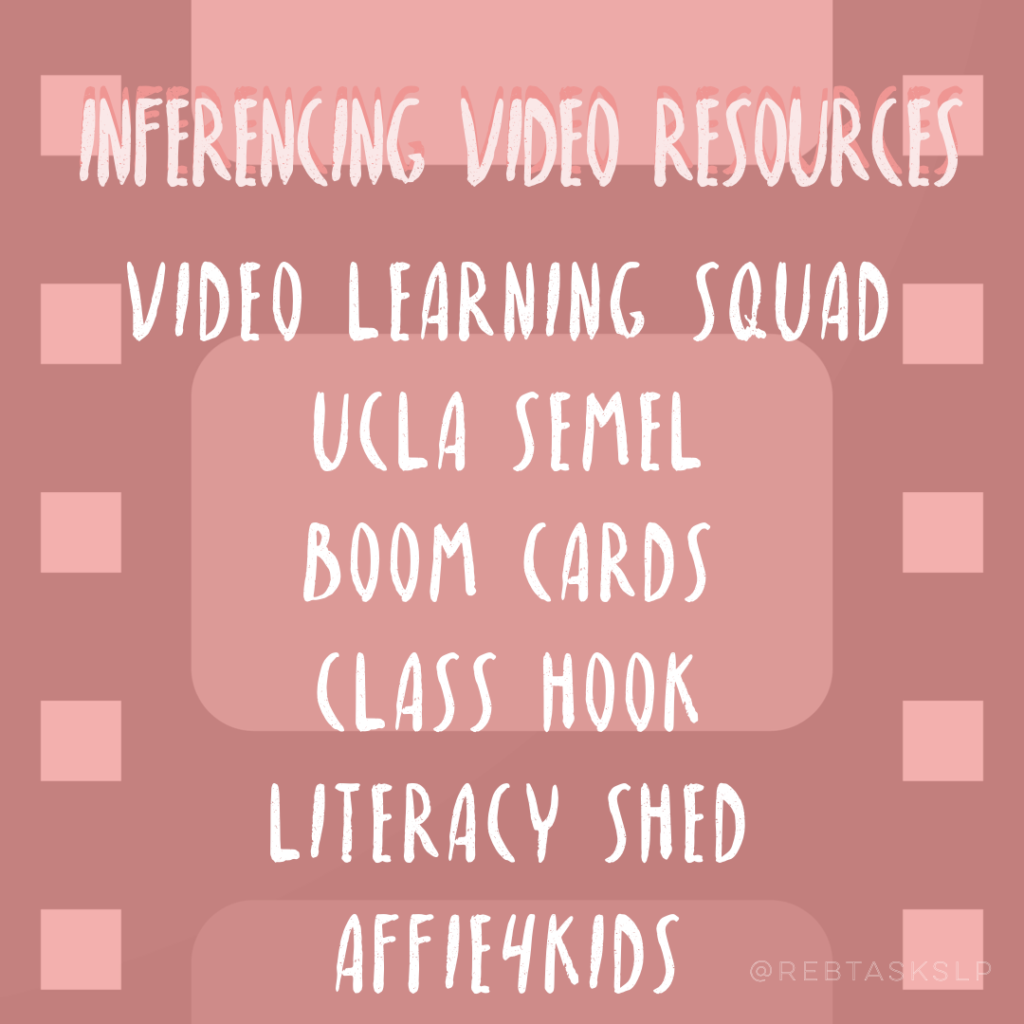
Inferencing through videos is a way to bring to life, social situations and experiences with characters and/or actors who solve problems and break down the “why” in others behaviors and actions. Inferencing is the way we pick up on certain non-verbal and verbal cues, based on our reasoning and previous knowledge of situations. Inferring is a very real and important social skill to understand and not always innate in nature. Often children who are diagnosed with pragmatic disorders, have difficulty with inference, so social and online learning videos help provide a safe space for understanding and practicing social inferencing. The videos are a great way to teach, learn language and social skills while in a therapeutic environment. Here are some of my favorite video resources that I use in speech teletherapy.
- Video Learning Squad
- The Video Learning Squad is both a paid and a free resource that was designed by the Lavi Institute, which conducts research to help the needs of children and young adults with communication disorders. The videos are designed for students between the ages of 7 and 21 with both a beginner and advanced program. This program is special because the videos use a peer mentored approach to developing social skills by allowing similarly aged children to explain what went right or wrong in certain situations. It’s been clinically tested and used with children and teens with Autism Spectrum Disorder, Social Communication Disorder, Emotional Disturbance and Intellectual Disability.
- UCLA Semel
- The Semel Institute for Neuroscience and Human Behavior at UCLA has created some of the best videos for speech therapy with topics like learning social skills, especially with friend making and keeping strategies. Their PEERS curriculum is the only evidence- based social skill program and can be purchased online and is in practice all over the world. The videos use easy to understand language that is realistic and applicable for learning social skills through online videos.
- The Institute also has other great resources in the area of social skills including curriculum books and in-person programs!
- The Book:
- Here are some In-Person Programs that follow the PEERS model:
- Boom Cards
- Boom Cards are a great tool to use during teletherapy to learn inferencing. They can be made quickly and tailored for a specific situation and setting. They allow an interactive method for learning via a digital deck of cards that provide feedback. I have created simple and free decks that are amazing to use with a variety of clients. They are great for narrating social stories and social scripts and are flexible and easy to use.
- My Video BoomCards: https://wow.boomlearning.com/deck/positive-emotions-and-feelings-drag–drop-NPauE6CoL6uqk9ohT
- Literacy Shed
- Literacy Shed
- Literacy Shed Free Resources
- The Literacy Shed has both free and paid resources that provide short, fun videos about various topics through imaginary situations! The videos have step by step instructions on when to pause the videos and what questions to ask to better promote learning. A way to implement this would be using this example:
- For example the video, Marshmallows, could be played in speech therapy. I would ask the child to watch the first 20 seconds of the video, then ask “why is the monster creeping up on the boy” or “what do you think is going to happen next?”. These questions allow inference and critical thinking to occur. It keeps the children engaged during speech teletherapy because the videos are short and age appropriate. I like to show the videos to the child first, then do a recall task and have them narrate it the second time. I will often prompt them with a visual aide such as this, WH card deck so that they are focusing on the main question.
- Class Hook Class Hook is another amazing online resource that takes popular TV shows and movies and turns them into educational products. The website is organized into different topics and subjects such as Math, English etc; but my favorite is the Social Emotional Learning section. You can even search based on grade level so you know that you are getting the best videos for your child! These are great because you can add any inferencing questions that you think would be beneficial.
- ClassHook FAQ Video
- Affie4Kids is a YouTube based program that helps promote positive self talk through short animated 5 minute videos. The videos focus on appropriate non-verbal and verbal behaviors and problem solving through engaging and original animations for young children and early teens.
- More information on Affie4Kids on PBS Utah
Inferencing Questions to ask during the videos
- What do you think will happen next?
- Where do you think they are going?
- How are they going to __?
- Why do you think __?
- How do you think ____ feels ?
- What probably caused ____?
- What would you do in this situation?
- Tell me the story of what happened.
- Why did __?
- How did ___ know ____?
- What is ___ thinking?
A general rule of thumb for inferencing questions is that they usually begin with question words!